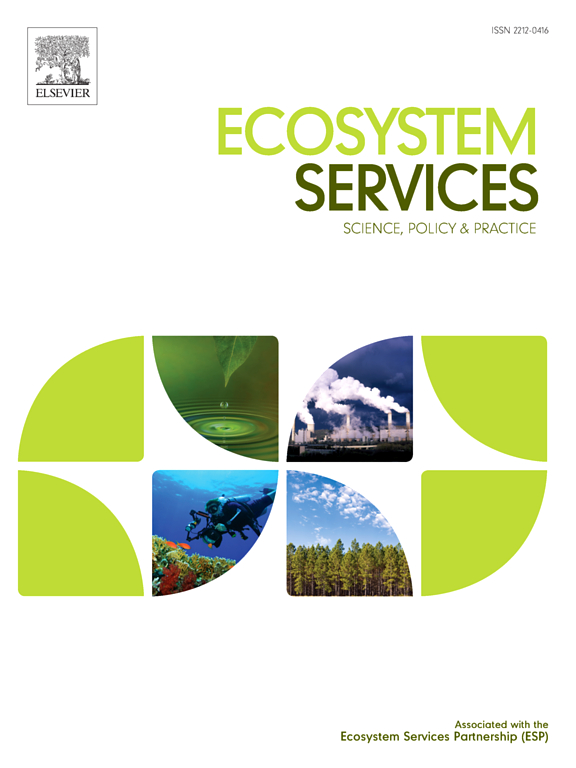人口统计学偏差对日本社会媒体文化生态系统服务评估的量化影响
IF 6.6
2区 环境科学与生态学
Q1 ECOLOGY
引用次数: 0
摘要
传统的问卷调查等方法难以量化文化生态系统服务(CESs),因此越来越多的研究开始利用社交媒体获得的大数据来评估文化生态系统服务。虽然从社交媒体获得的数据通常被认为是有偏见的和不具代表性的,但偏见对社会责任评价的实际影响很少被量化。在这项研究中,我们从微博服务Twitter上选取帖子,并调查了人口统计学偏差对社交媒体中可用于评估CESs的三个指标(空间分布、帖子情绪和旅行成本)的影响,并以日本国家公园为例进行了研究。我们发现,从随机抽样的1%帖子中获得的Twitter用户具有与日本人口不同的人口统计属性分布(年龄、性别和居住地区)。更重要的是,我们发现平台上的活动,如地理参考和发布的估计频率,在人口群体中是不同的。这表明,通常由地理参考帖子数量评估的CESs的空间分布可能受到其他人口统计学偏差的影响,而这些偏差无法通过基于社交媒体平台上所有用户的统计来捕捉。另一方面,在三个指标中,只有空间分布受到用户人口统计属性的强烈影响,这表明每个指标的偏差潜在影响是不同的。这些结果清楚地表明,要获得具有代表性和包容性的社会经济评价,必须考虑人口统计特征及其潜在影响。本文章由计算机程序翻译,如有差异,请以英文原文为准。
Quantifying effects of demographic biases on estimation of cultural ecosystem services using social media in Japan
Quantifying cultural ecosystem services (CESs) has been difficult using traditional methods such as questionnaires, so increasing numbers of studies are utilizing big data obtained from social media for evaluation of CESs. Although data obtained from social media are often considered to be biased and non-representative, the actual effects of biases on evaluations of CESs are rarely quantified. In this study, we sampled posts from a microblogging service, Twitter, and investigated the effects of demographic biases on three indicators capturing aspects of social media which can be used for evaluations of CESs (spatial distribution, sentiment of post, and travel cost), focusing on the Japanese national parks as a case study. We found that Twitter users obtained from the randomly sampled 1% posts had a different distribution of demographic attributes (age, sex, and residential prefecture) from the Japanese population. More importantly, we found that activities on the platform such as estimated frequency of georeferencing and posting are different among demographic groups. This indicates that spatial distribution of CESs commonly evaluated by the number of georeferenced posts can be affected by additional demographic biases which cannot be captured by statistics based on all users on social media platforms. On the other hand, among the three indicators, only spatial distribution was strongly affected by the demographic attributes of users, indicating that the potential effects of biases are different for each indicator tested. These results clearly show that consideration of demographic attributes and their potential effects would be necessary to obtain representative and inclusive evaluations of CESs.
求助全文
通过发布文献求助,成功后即可免费获取论文全文。
去求助
来源期刊

Ecosystem Services
ECOLOGYENVIRONMENTAL SCIENCES&-ENVIRONMENTAL SCIENCES
CiteScore
14.90
自引率
7.90%
发文量
109
期刊介绍:
Ecosystem Services is an international, interdisciplinary journal that is associated with the Ecosystem Services Partnership (ESP). The journal is dedicated to exploring the science, policy, and practice related to ecosystem services, which are the various ways in which ecosystems contribute to human well-being, both directly and indirectly.
Ecosystem Services contributes to the broader goal of ensuring that the benefits of ecosystems are recognized, valued, and sustainably managed for the well-being of current and future generations. The journal serves as a platform for scholars, practitioners, policymakers, and other stakeholders to share their findings and insights, fostering collaboration and innovation in the field of ecosystem services.
 求助内容:
求助内容: 应助结果提醒方式:
应助结果提醒方式:


